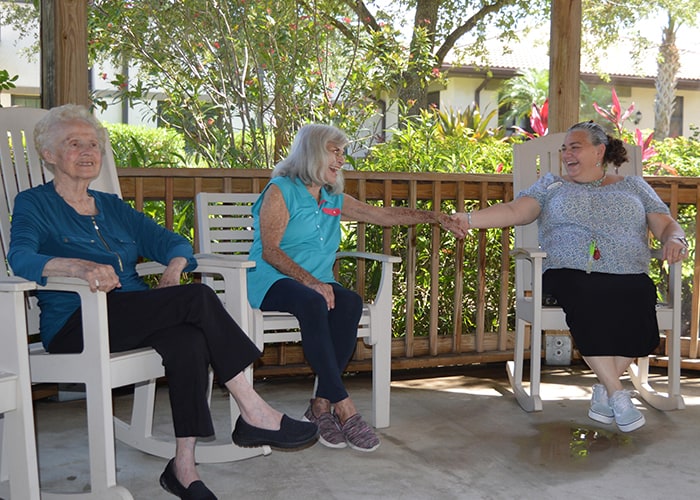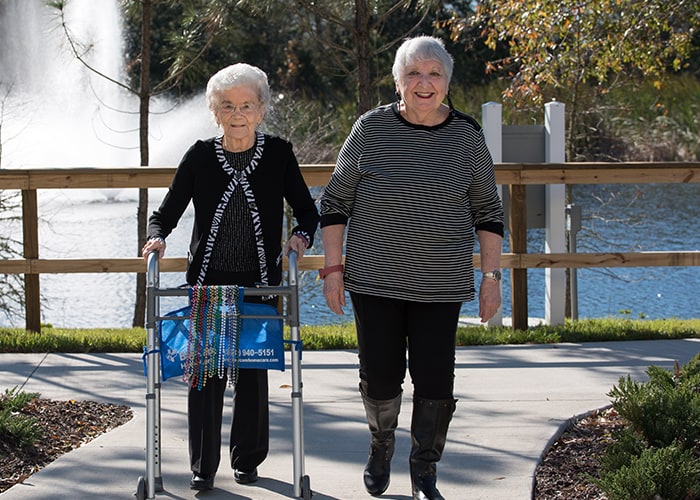Discussing care options with an aging loved one can be a sensitive, and often challenging, topic. Respite care can be beneficial to both caregivers and their loved ones, providing the former with a much-deserved break and allowing the latter to explore what a senior living community offers.
Unlike long-term assisted living, respite care is temporary care designed to give caregivers time to recharge or to take care of other responsibilities while their loved one continues receiving support. Start the conversation early, be prepared with the right information, and exercise patience, empathy, and respect when broaching this topic with an older loved one.
Explaining Respite Care
First, make sure that you and your loved one understand what respite care is. It’s not the same thing as assisted living or moving into a nursing home.
Respite care offers short-term relief for primary caregivers by providing care for their loved ones while they take a well-deserved break. Services can be provided at home, through adult day care centers, or within senior living communities like Inspired Living.
Respite care is available for varying time frames—from a few hours to several weeks. This flexibility allows caregivers to travel, relax, or tend to other family responsibilities, all while knowing their loved one is being looked after. Respite care can also provide transitional support for seniors recovering after an illness or hospital stay.
Benefits of Respite Care for Caregivers
Caregiving is a noble pursuit, but caregivers also deserve support and the occasional break. Respite care can help caregivers by:
- Providing time to fulfill other responsibilities: Caregivers can catch up on work, help with childcare, or attend their own health appointments, all while knowing their loved one is cared for.
- Helping caregivers avoid or recover from burnout: Caregiving can lead to burnout, which has serious effects, including anxiety, depression, exhaustion, and getting sick more often.
- Letting caregivers recharge: People are often more able to take care of others when they’re cared for themselves. A rested caregiver may be in a better position to provide quality care to their loved one.
Benefits of Respite Care for Older Adults
Loved ones can also benefit from a temporary change like respite care. For example, respite care can offer:
- Professional help: Respite care can be especially suitable after a hospital stay, surgery, or illness. In these cases, the professional support provided by a respite care program can be very helpful.
- A taste of community living: Respite care gives older adults the chance to experience what it’s like to live in a senior living community without a long-term commitment. This can help them plan for the future when they may need more involved, long-term care.
- Access to services, amenities, and programs: Communities like those at Inspired Living often offer services, amenities, and programs you can’t easily access if you typically live at home. Residents can try new recreational activities and events during their stay.
Tips on Discussing Respite Care
Talking about respite care can be challenging. Here are practical strategies to guide your conversation:
Start the Discussion Early & Be Prepared
Try to talk about care options before you need them. This provides time and room for flexibility and will help your loved one feel less rushed or pressured. Talking early about care options also allows older adults to make important decisions at a time when they’re fully able to.
Come prepared for the conversation. Know the difference between respite care and long-term care and be able to explain it. You can also come up with a few specific options, along with costs and services.
Here is one way you can begin the conversation: “I’ve noticed that caregiving takes a lot of my energy, and I want to be at my best for you. I found an excellent respite service nearby, and I think we should explore it together.”
Talk In Person, Face-to-Face
This is an important conversation. Talking face-to-face treats the topic with appropriate respect. Having the conversation in person is also more accessible if your loved one has hearing impairments, and it allows everyone involved to read each other’s body language.
It’s a Conversation, Not a Lecture
Frame the discussion as a collaborative decision. Avoid seeming like you’re dictating what will happen. You can ask questions about your loved one’s experiences and what they may prefer, then discuss whether respite care can meet these preferences.
Seniors are adults. They appreciate someone showing respect for their life experiences.
Use “I” Statements
“I” statements have long been used to foster more constructive conversations. “I” statements can help people avoid sounding too confrontational.
Here’s an example of a statement that may feel accusatory: “You make me feel exhausted. I want a break from you.” Instead, try an I-statement that puts more emphasis on the situation than assigning blame. For example, try: “I feel exhausted when I come home from work and we have all these tasks. I’d like to explore options for extra support so I can take an occasional break.”
Exercise Patience & Respect
Finally, remember to be as patient, respectful, and compassionate as possible. Respite care may be a sensitive topic for some people, so be gentle and let your loved one process the situation at their own pace. You may need to have this conversation several times.
Respite Care With Inspired Living
You may want to consider respite care if:
- Due to a schedule conflict, a caregiver is temporarily unavailable to provide care
- A surgery, illness, or hospital stay makes additional professional support a helpful idea
- A caregiver can benefit from some time off
During their stay, respite care residents can enjoy all the services offered by Inspired Living. These include housekeeping, community amenities, dining services, events, and programs. If you’re curious about how respite care can meet your unique needs, get in touch with us today.


























